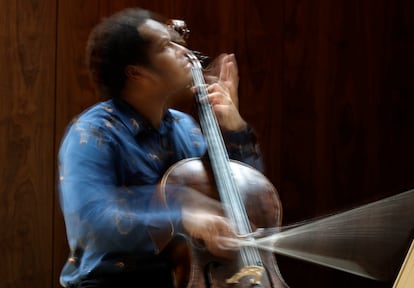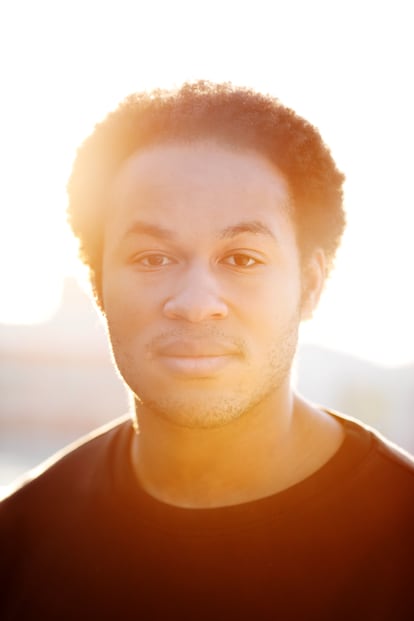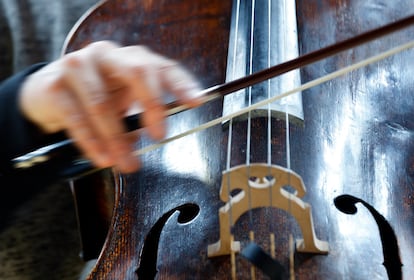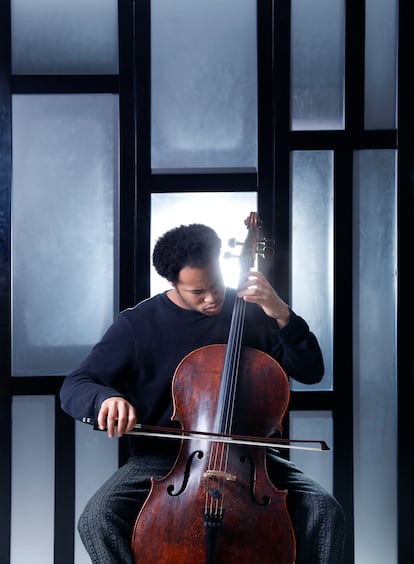Sheku Kanneh-Mason, the cellist who performed at Henry and Meghan’s wedding and took classical music by storm
After two billion people watched the 24-year-old virtuoso perform at the royal wedding, his career has skyrocketed. Together with his six siblings — all musicians — Kanneh-Mason is breaking down racial barriers to resounding applause.

Now that Sheku Kanneh-Mason doesn’t have to use public transport in Nottingham, UK, she has a bus named after her. The boy is a hero in the English city where he was born 24 years ago after he won the BBC award for a young musical talent in 2016. He was 17 and was the first black artist to conquer it after dazzling the country on television with his cello between his legs.
But what for many of his compatriots was an oddity, for Sheku was normal. He hadn't been the one to single-handedly break another racial barrier. It came after the effort of his family. Of his two parents, Stuart, manager of a hotel chain and Kadiatu, a university professor of literature, along with their seven children: all musicians!
When Sheku, the third in the house, achieved his flash of popularity, the spotlights turned on that Nottingham home where talent was overflowing. "I have hardly noticed a difference in the musical world at the race level because for me it has been natural to grow up playing with my brothers," says the interpreter. The Kanneh-Mason band is made up of Isata, the eldest, pianist, Braimah, second, violinist, the same as Konya and Aminata, as well as Jeneba, who dominates the piano and cello, like Mariatu, the youngest.

Soon they were invited to play in a group on talent shows where, despite the unbearable noise of praise on air, as exaggerated as it was empty, there has been an occasional discovery from time to time. If the United Kingdom knew the family that year, three years later, the whole world noticed them. It was after Sheku performed at the wedding of Meghan Markle and Prince Harry, Dukes of Sussex, an apparition that went around the planet from Windsor Castle. The event reached an audience of around 2 billion people. That day, among the pomp, the fresh air of a young black musician slipped in, playing on the cello Sicilienne, by Maria Theresia von Paradis, Après un Rêve, by Fauré and the Ave Maria, by Schubert. However, that did not alter the spirits of the boy, focused, grateful and still aware of his training, even though a week later, agents from half the world wanted to work for him. “I know, but I didn’t change because I already had one,” he says.
Then he had already made his debut as a professional, but today, Sheku Kanneh-Mason’s career is a gale that has not altered the spirits of his family much, although luck has. It was not the cellist who started. His older sister had done it before, with whom he has already recorded a duet album for the Decca label: Muse, with works by Barber and Rachmaninov. Nor did their parents conscientiously plan for them to dedicate themselves to music as a means of earning a living, but very soon the talent of the eldest began to emerge and the example of her determination dragged the rest to the point that four of its components have finished studying at the Royal Academy of Music in London, that is, at the highest level.
The normal thing, due to their condition, was that, if they were determined to shine at something, they would dedicate themselves to sports, their parents have commented. They also excelled at it. But that barrier had already fallen in his generation. Stuart and Kadiatu recall at the turn of the 21st century the trend in which British football teams were filled with players of African and Caribbean origin, like themselves. Stuart comes from a family from Antigua and Montserrat in the Americas, while Kadiatu's parents immigrated to England in the 1970s from Sierra Leone in West Africa.
The two also grew up in musical environments and this led them to transmit to their children discipline and rigor as well as the pleasures that classical music provides. But they did not always understand them in their environments. Some parents of schoolmates, black and white families, criticized him. They did not consider that this environment was recommended for kids of their race. In a joint interview that Helga Davis did for Princeton University, the parents recall those episodes: “When they started to stand out, people told us: why go on, that's not for black children. Well, no, they are not black children. They are simply children”, Stuart rebelled. Several parents did not shy away from telling the Kanneh-Masons that they were headed for certain failure and that, given the sentence, they were asking too much of them, leading to a frustration that would end up affecting their children deeply.

Somehow, that motivated them. “Our duty as parents was to encourage them to take risks and at the same time to feel supported by it. We didn't want them to look back a few years from now and regret not having tried." Sheku, today, hardly wants to think about the future. When we ask him where he imagines himself in ten years, he answers: "Enjoying music with others better than me, learning and perfecting myself."
The last time he went through Spain on tour, he played alone with his instrument built by the luthier Matteo Gofriller in 1700. He chose pieces by Bach and Benjamin Britten, but also works by contemporaries who have written for him, such as the five preludes dedicated to him by Edmund Finnis, apart from others composed by Gwilym Simcock, Leo Brouwer or Gaspar Casado. Although Sheku prefers chamber music and also concerts with an orchestra. In all these fields, as teachers who have marked the history of the instrument, he has his favorite references: Jaquelin de Pré and Mstislav Rostropovich.

The first also broke the mold and perhaps for this reason it has become the cellist's greatest inspiration. Her Elgar concert is difficult to emulate, especially the version she left with John Barbirolli or the concerts she recorded with her husband, Daniel Barenboim. Even so, it is the work with which the director Simon Rattle wanted to join Sheku to play it in public and also register it for Decca together with the London Symphony Orchestra, as Du Pré did in his day. "The experience has been incredible, he is authentic, genuine and Elgar's piece is my favorite work," says the interpreter. “First he and I rehearsed at the piano together, then we played football - he is a fan of Arsenal - and then we hit it hard. Plus, we recorded it at Abbey Road studios,” he says.
He must have felt somewhat self-conscious there, not only because it was the place where the Beatles locked themselves up and later all the iconic British pop, as well as the country's great orchestras. Also because Elgar himself had inaugurated them in 1931. Those on Abbey Road are walls whose soundproofing systems deafen with the weight of their own history. The fact of doing it together with Rattle, already a true legend, a musician with a very modern mentality and extraordinary charisma, who brought the Berlin Philharmonic into the 21st century, transforming its German essence into a radically cosmopolitan ensemble, would also weigh on him. The director of Liverpool renewed it with top-level musicians and very different origins. A perfect teacher to guide Sheku and take him by the hand into a world still anchored in the past, which urgently needs a bath of miscegenation to survive.
The cellist, in that, has become a global icon in high demand in various venues around the world. Asia and Latin America are now very much integrated into the circle. The refreshing phenomena that have led to references such as the Venezuelan Gustavo Dudamel in conducting or the Chinese Lang Lang and Yuja Wang for the piano have dragged a multitude of new talents from their orbits to the auditoriums. Sheku doesn't want to feel pressured by his African origins, even though he considers himself deeply British. But understand the parallelism. Figures of his race were missing in the circuit. “It makes me happy, every time someone young approaches me and tells me that I have been an inspiration to them, it fills me with joy. Although I prefer not to think about it, ”he says.
He is comfortable and aware of being a striking novelty on the stages he steps on, although he sometimes puts on a protective anti-pressure layer, at an age where any excess of expectations can be lethal for a career. “Sometimes I confess to having felt strange, sometimes out of place. But my connection to music is so strong that I consider myself a part of that world in a very profound way. I have also had teachers who have instilled in me that feeling of belonging”.
This has been the case not only at home, but also in Nottingham where he learned simply by listening to others in the city's concert hall. “Growing up there was good, you feel the connection to the small town community. It does not have an orchestra, but we have a large concert hall that offers cheap tickets. We went a lot, since we were little, almost every week, it was the best way to get to know the repertoire”.
Perhaps, largely to their regret, not only in their case, but their entire family, they carry the burden of being an example. This is how her mother tells it in House of music, raising the Kanneh-Masons, the book she published in 2021. In it, Kadiatu tells how, apart from making an effort and becoming aware of representing a model, they had to prepare to know how to resist and never, therefore, stop showing kindness. "A quality that in these times is scarce," says his mother.
Also, or above all, to enjoy without obsessing. To not feel complexes of any kind or that this represented a forbidden ground for them. That would make them give up. And at the Kanneh-Mason house they do not lower their arms. In a way, they believe they can change the world. “Inequality and racism revolt me, everything that goes with it confuses and frustrates me,” says Sheku. Same as Brexit. “I hate it. I couldn’t vote in the referendum, I hadn’t turned 18, but for us that decision represents a problem every day, it makes life more difficult for us, not to mention that I and so many young people of my generation feel like Europeans. Showing your passport to leave my country is a step backwards.”
Sign up for our weekly newsletter to get more English-language news coverage from EL PAÍS USA Edition
Tu suscripción se está usando en otro dispositivo
¿Quieres añadir otro usuario a tu suscripción?
Si continúas leyendo en este dispositivo, no se podrá leer en el otro.
FlechaTu suscripción se está usando en otro dispositivo y solo puedes acceder a EL PAÍS desde un dispositivo a la vez.
Si quieres compartir tu cuenta, cambia tu suscripción a la modalidad Premium, así podrás añadir otro usuario. Cada uno accederá con su propia cuenta de email, lo que os permitirá personalizar vuestra experiencia en EL PAÍS.
¿Tienes una suscripción de empresa? Accede aquí para contratar más cuentas.
En el caso de no saber quién está usando tu cuenta, te recomendamos cambiar tu contraseña aquí.
Si decides continuar compartiendo tu cuenta, este mensaje se mostrará en tu dispositivo y en el de la otra persona que está usando tu cuenta de forma indefinida, afectando a tu experiencia de lectura. Puedes consultar aquí los términos y condiciones de la suscripción digital.









































